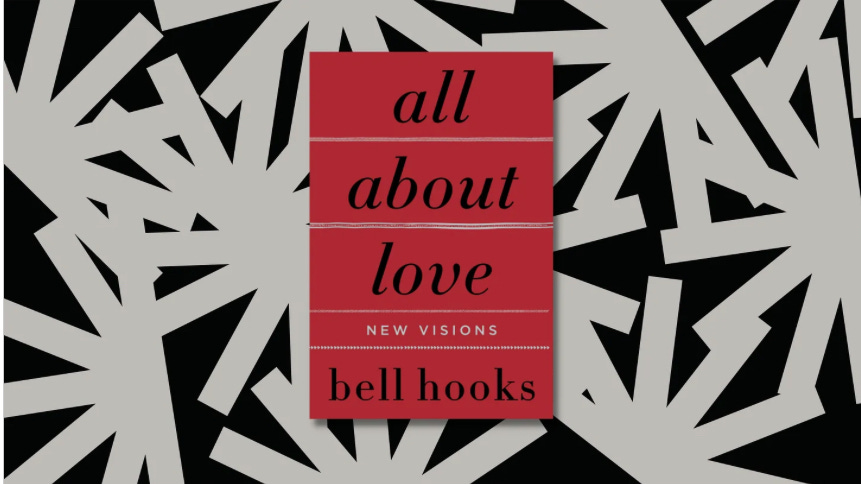A Return to Love: Bell Hooks and the Revolution We All Need
Hope Infusion Newsletter “Easter Edition” - April 20, 2025
Today, many are celebrating Easter—a day that honors resurrection, renewal, and ultimately the transformative power of love. At its core, Easter commemorates sacrifice born of profound love, a love meant to heal and liberate.
In that spirit of contemplating love's revolutionary power, I'm sharing reflections on a book that transformed my understanding of what love truly means in practice.
A Book I Didn't Know I Needed—Until I Did
"I just know that one day I was no longer precious."
These words struck me like lightning. I was staring at a screenshot my writing teacher had sent of an opening passage from bell hooks' "All About Love." Something in me shifted as I read it, a recognition so profound I instinctively glanced at my bookshelf.
There it was. I'd bought the book months earlier, drawn to it without knowing why, but had never cracked its spine. Now I understood the pull. Here was someone who had named what I had never fully articulated: that my understanding of love came from its absence. That I, too, had experienced that devastating moment when I realized I was "no longer precious" in someone's eyes.
Some books find you exactly when you need them. That same day—as if the universe were insisting—I discovered a five-week seminar on bell hooks' work starting that very night. I signed up immediately. In the years since, her words have become a compass, especially now, when her vision of love as revolutionary practice feels more urgent than ever.
Love as Verb, Love as Revolution
bell hooks was not writing about romance. She was writing about revolution.
She was born Gloria Jean Watkins in 1952, but chose to write under her great-grandmother's name—bell hooks—spelled in all lowercase letters because the message mattered more than the messenger. Truth over ego. Transformation over recognition.
Her work was clear: love, when truly practiced, is the most radical force we have.
In "All About Love", hooks offered a seismic shift: "The word 'love' is most often defined as a noun... yet we would all love better if we used it as a verb."
A verb. Not something we feel, but something we do. Not passive, but active. Not sentiment, but practice. She dared us to ask: What if love wasn't just an emotion, but a political act? What if justice itself was an expression of love?
hooks wrote because she understood that without love, there can be no justice. And without justice, love becomes just another hollow promise.
Love and Liberation: Dismantling What Divides Us
Growing up amid segregation, hooks became one of the fiercest critics of what she called "the imperialist white supremacist capitalist patriarchy." But she didn't stop at naming systems—she showed how they disfigure our ability to love.
She understood that oppression thrives on disconnection. That domination depends on division—from each other and from ourselves. Fear, shame, and internalized dehumanization make true love impossible.
hooks taught that love isn't about comfort but courage. Not pleasure but accountability. Not something we fall into but practice daily, especially when it's hard.
She called us to love critically, because to love without truth isn't love at all—it's avoidance. And to pursue justice without love risks becoming just another form of domination.
Why Love Matters Now
I keep returning to hooks' words because they speak directly to this fractured moment we're living through. Her diagnosis of our "lovelessness" feels prophetic in an era where contempt has become currency and division our default.
When I feel overwhelmed by the headlines, by the cruelty that seems to be winning, I remember her insistence that love is our way forward—not as sentiment, but as practice. As the courage to see clearly, speak truthfully, and act with fierce compassion.
hooks saw this hunger coming. She wrote about toxic cultures of domination before we had language for "othering" or "cancel culture." She knew fear and shame drive cycles of violence—both personal and political.
And she called us back. To truth. To accountability. To justice, rooted in love. Not a feeling. A practice.
The Only Revolution Worth Having
For me, "All About Love" isn't just a title—it's the lifeline I grabbed when my own wounds threatened to harden into walls. It's what I return to when despair feels easier than hope.
It's easy to default to anger, fear, and exhaustion. It's harder to practice love. But hooks reminds me: Love is not easy. Love is not sentimental. Love is work.
Work we do in our homes, communities, and justice movements. Work we do when the world tells us nothing will change.
What about you? Where are you being called to return to love as a practice? What does love-in-action look like—even when it's uncomfortable?
As I reflect on bell hooks' legacy, I think of her insistence that love and justice are inseparable. That love is the active choice to nurture growth, healing, and collective liberation.
And it is the only revolution worth having.
In love and solidarity,
Olivia
If these reflections on love as revolutionary practice resonated with you, please consider sharing this essay with someone who might find bell hooks' wisdom as transformative as I have. Your support in growing this community of thoughtful readers means everything.





